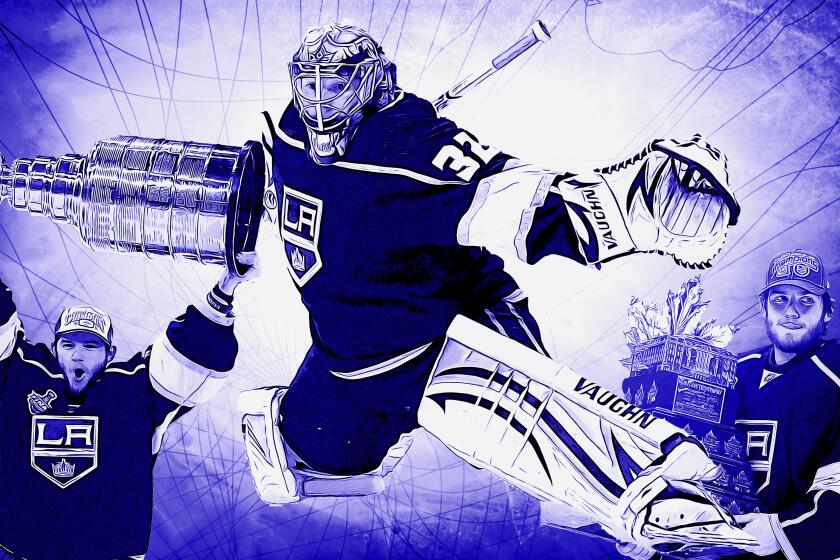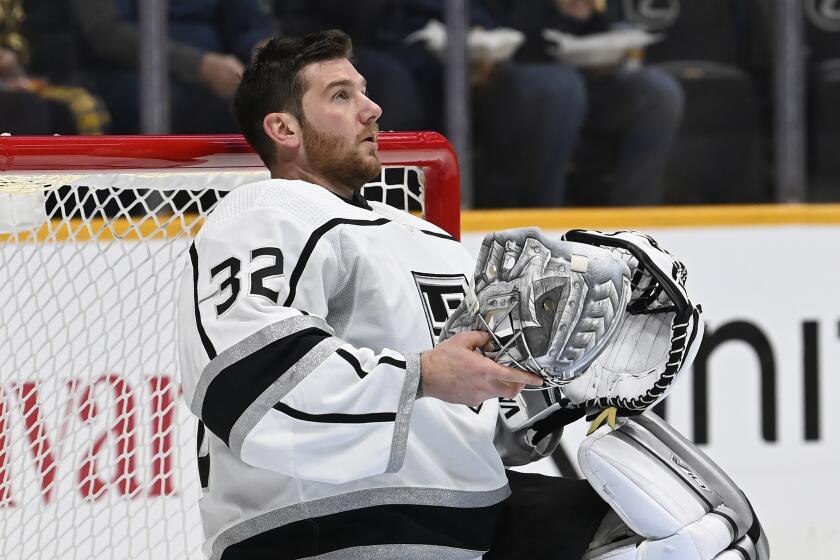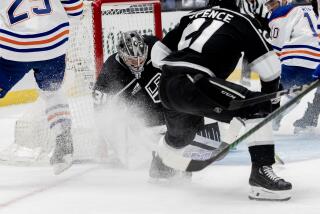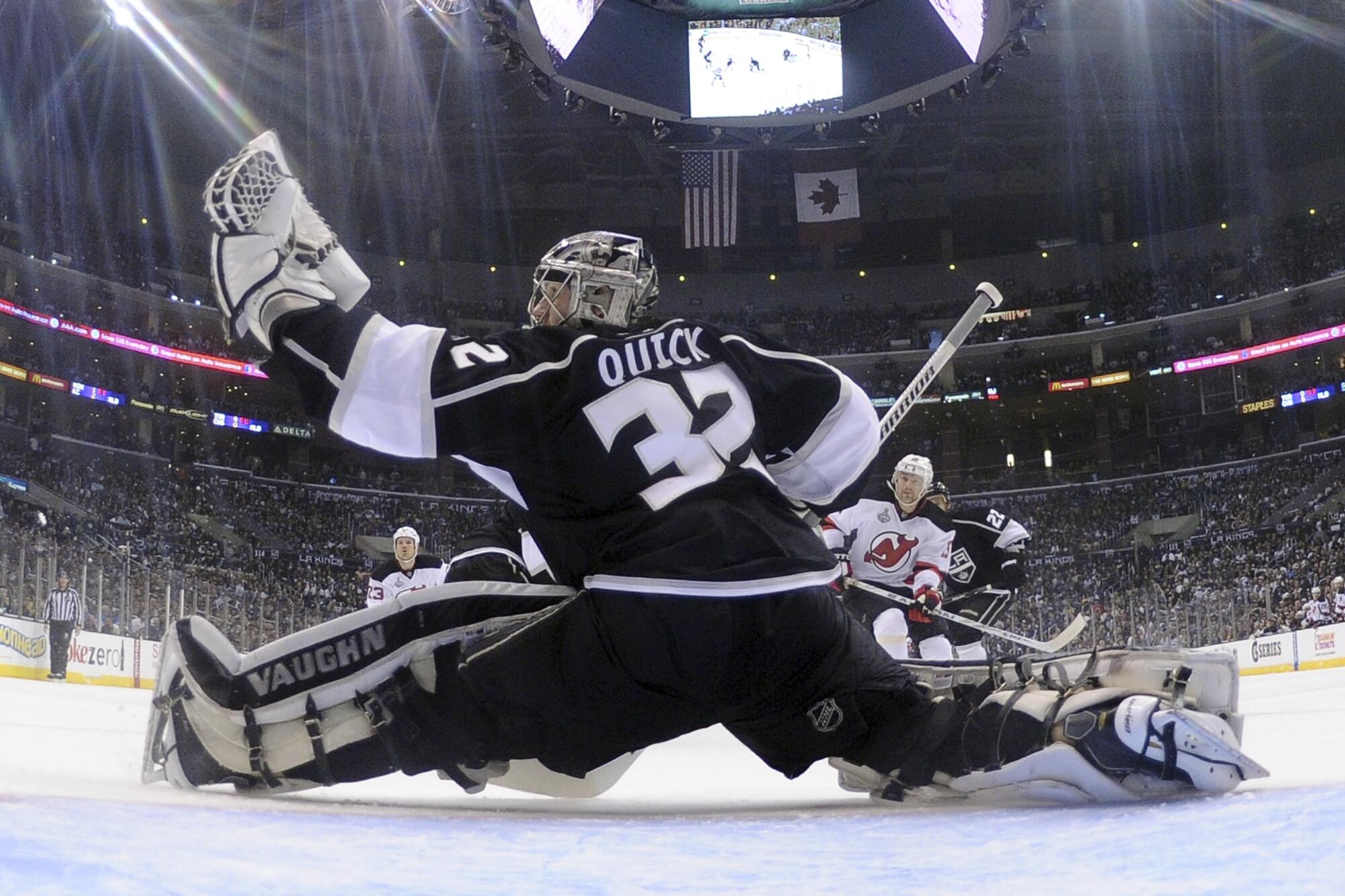
- Share via
As the Kings rebuilt yet again in the early 2000s, it became clear their goaltender of the future was likely to be a guy named Jonathan. But which one?
Early comparisons between Jonathan Bernier, their first round draft pick in 2006, and Jonathan Quick, their third round pick, and 72nd overall, in 2005, favored Bernier. He came from Quebec, the cradle of standout goalies, and he had excelled in the high-scoring Quebec Major Junior Hockey League. Quick had played high school hockey at Avon Old Farms in Connecticut. After being drafted he spent two seasons at the University of Massachusetts-Amherst.
As a pro, Bernier had solid credentials. Quick had a bad habit of oversleeping and being late for minor league bus trips. Missing a meeting with a coach earned him a demotion from the American Hockey League to the ECHL. It was a wake-up call he couldn’t afford to ignore.
The Kings followed their major trade with Jonathan Quick by dealing for Flyers forward Zack MacEwen before the NHL trade deadline.
“Bernier was drafted in the first round, so…,” Kings president Luc Robitaille said, his tone conveying the respect accorded a prime pick. “But Quickie came in and took the job. That’s what you always say: If you want to make the NHL, you’ve got to take someone’s job. He took it and ran with it.”
Quick learned to set several alarm clocks. He worked at his craft, distinguishing himself among the seven goalies who played for the Kings in 2007-08 by showing the athleticism and unquenchable fire that became his trademarks. He led them to the only two Stanley Cup championships in franchise history, in 2012 and 2014, and fended off challengers to his No. 1 status until this season, when his reflexes slowed and his struggles were undeniable.
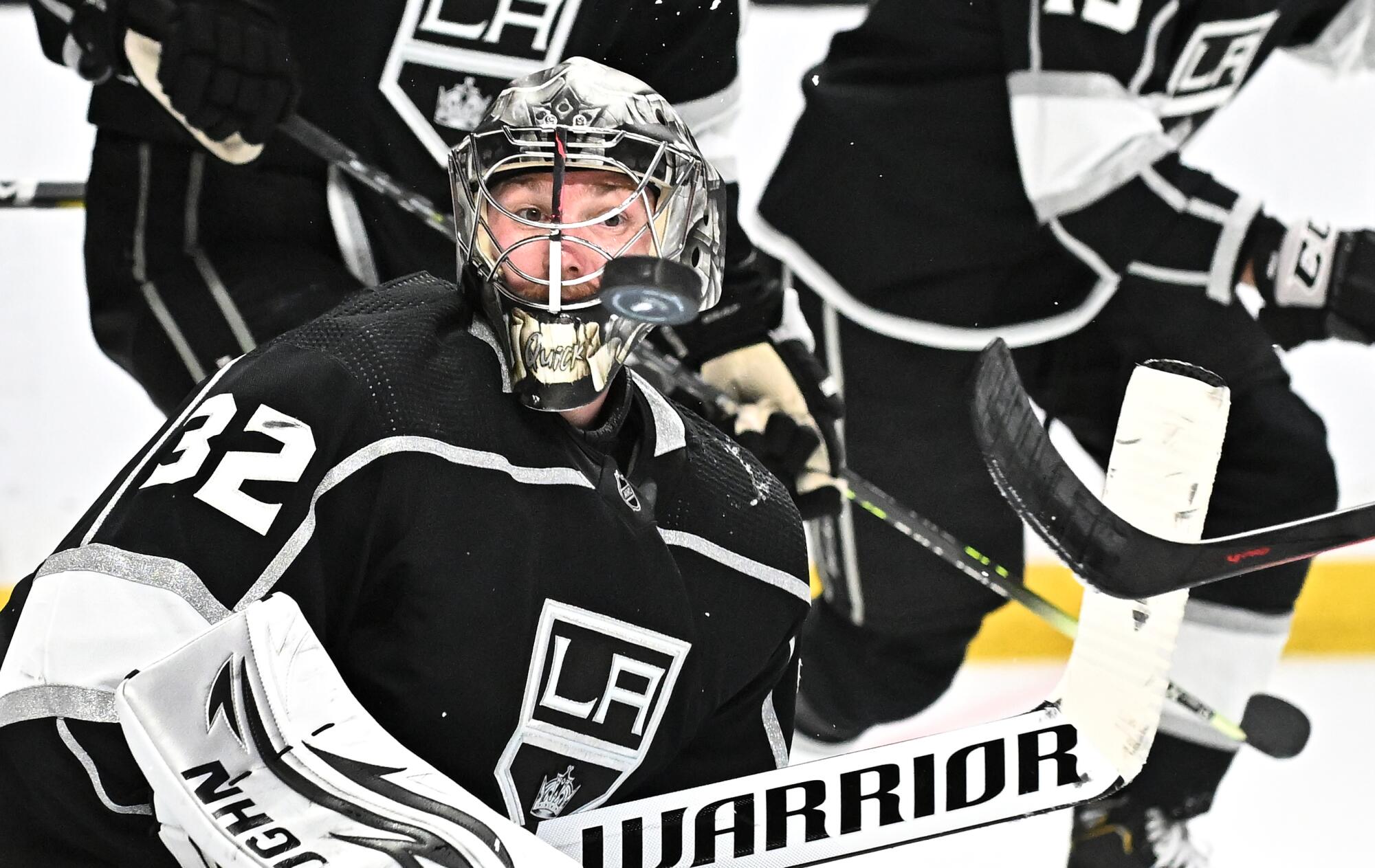
The Kings couldn’t win another Cup with him carrying the load. Going on without him seemed almost unthinkable.
He was so much a part of the Kings’ brotherhood and history that they were all shocked when general manager Rob Blake traded Quick to Columbus for brawny defenseman Vladislav Gavrikov and goalie Joonas Korpisalo, a deal announced Wednesday. On paper, the deal makes great sense for a team that was small on defense and inconsistent in goal. But people aren’t paper cutouts.
“I was thinking that Quickie was going to be a King for life and we’re going to play with him the rest of our careers too,” team captain Anze Kopitar said, speaking for himself and defenseman Drew Doughty.
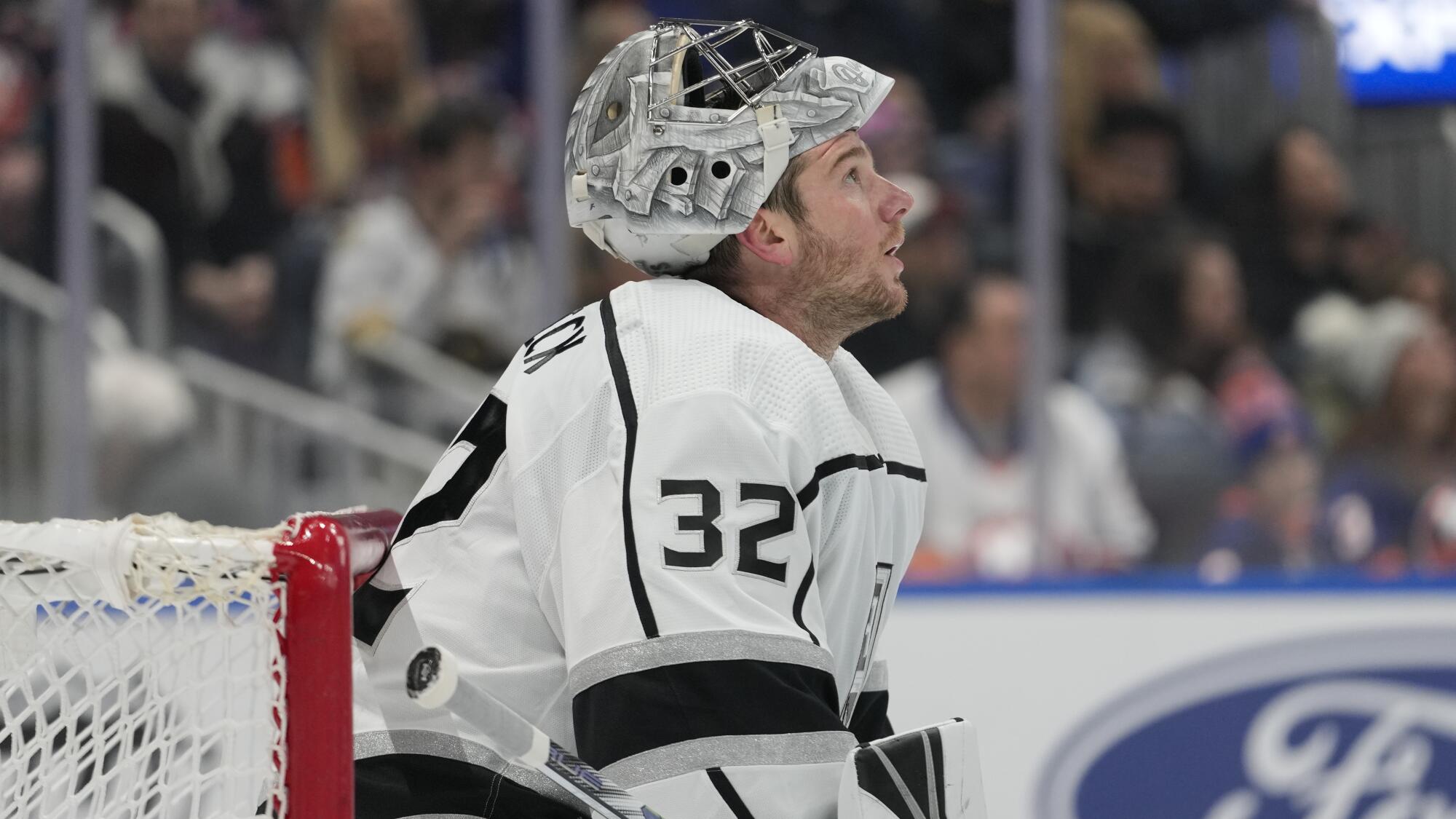
In an intriguing twist, Columbus traded Quick a day later to the Vegas Golden Knights. His value is in his playoff experience, not his recent performances, but his fire still burns — and it was stoked when he landed with a rival who could block the playoff run the Kings believe they can make without him.
“It’s motivating,” Quick told reporters in Las Vegas before he made his Golden Knights debut as the backup to Adin Hill on Friday. “I’m looking forward to being part of this team and do what you want to do every year: you want to win your division, you want to win playoff series, you want to win 16 playoff games. So whatever I can do to help them get there, that’s what I want to do.”
He might not reach his old standards again, but it won’t be for lack of effort.
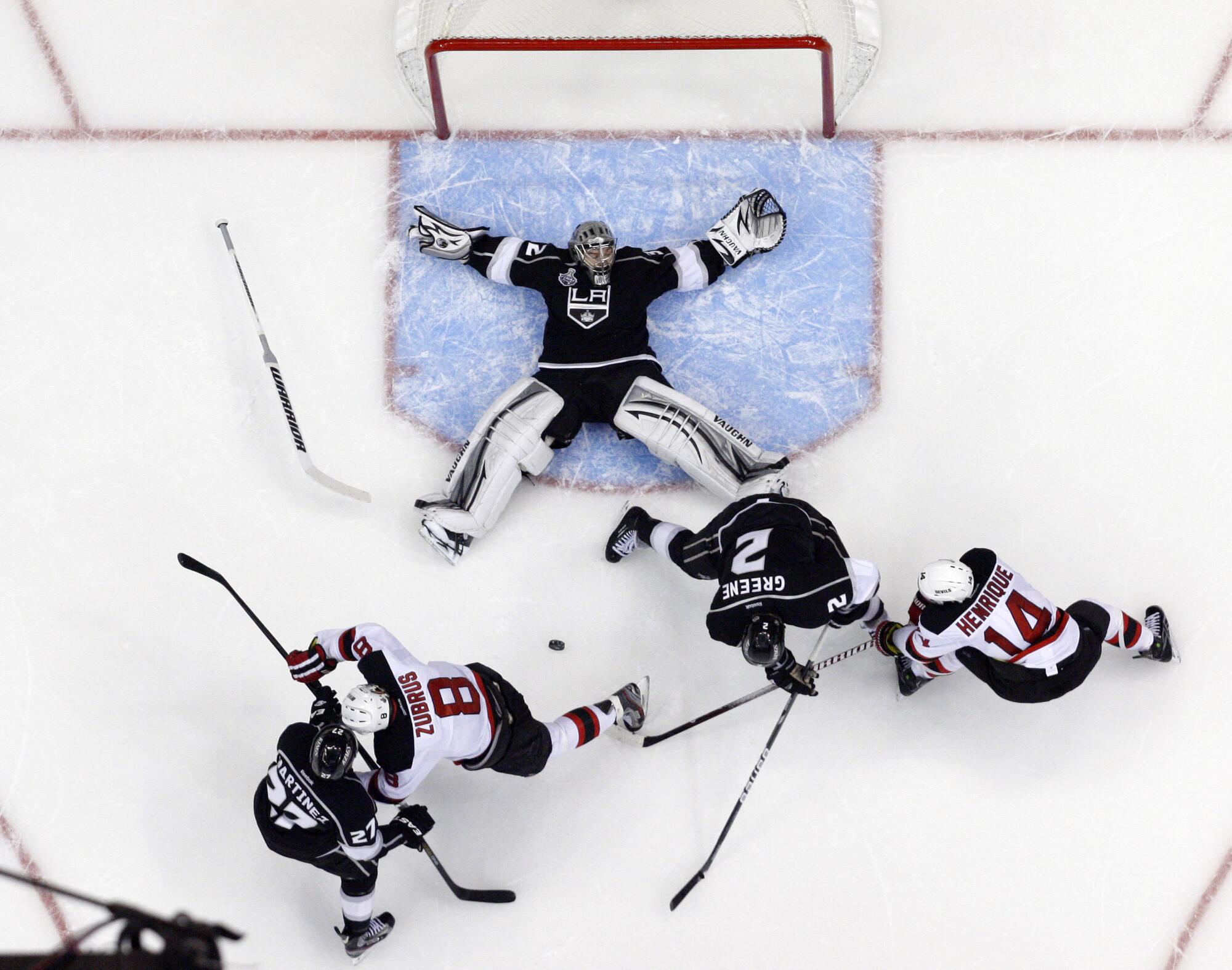
“He’s had a great career and I know full well today he’ll be ready,” Darryl Sutter, who coached the Kings’ Cup-winning teams and now guides the Flames, said last week. “His whole thing will be, ‘I want to show somebody.’ I can guarantee that.”
Quick’s excellence allowed a low-scoring, eighth-seeded team to blossom into an unstoppable force in the 2012 playoffs. Yet of all the saves he pulled off as the postseason most valuable player, none was more crucial than when his then 2-year-old daughter Madison began to choke on a piece of candy during his post-victory news conference and he dislodged it by patting her on the back. “Sorry, M&M crisis,” he said calmly.
He was the reason the Kings won again in 2014 despite losing the first three games of their first-round series against San Jose and falling behind in each of the next two rounds. “If you ask me what’s the first thing that comes to mind, it’s that he’s probably the fiercest competitor I’ve ever seen,” Robitaille said. “You always hear goalies are different, but he was different in a way where his competitiveness was superior to anyone.
Jonathan Quick led the Kings to two Stanley Cup championships, but for them to contend again the front office needed to make changes.
“I know when we were down 3-0 against San Jose, I don’t know when and how but I know he told the team, ‘That’s it. We’re shutting the door. We’re turning it around.’ And we know what happened.”
Sutter called Quick “old style,” his ultimate compliment. “That’s a guy who played a lot of playoff games and played hurt and had major surgeries after a couple of them and still came back. He’s a warrior,” Sutter said. “He’s a great leader in the room. Great work ethic. Great personality. Dominant competitor, I’ll tell you that. A lot of those series…they were tough series. Those teams had good goalies, too, and that was his challenge: he wanted to be better than the other goalie.”
Unlike many of his peers, Quick never yelled at teammates who obscured his view or made his job tougher. He’d fire the puck past the ear of someone who scored on him in practice and he’d sometimes smash his stick against the post in frustration, but he never pointed fingers during games.
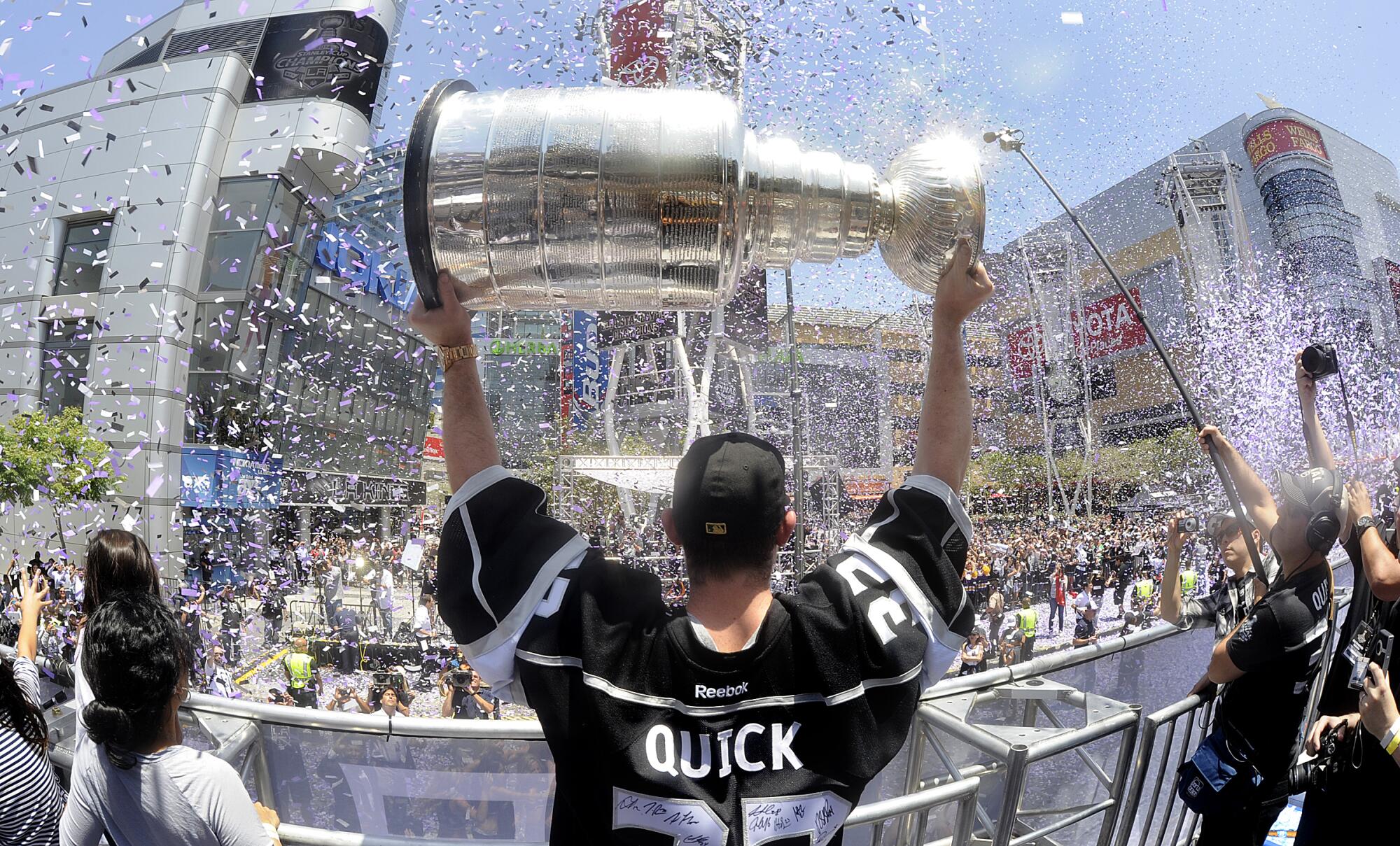
“You see other guys around the league throw their hands up when their d-man is screening them and the puck goes in. You’ll never in a million years see Quickie do that,” Doughty told The Los Angeles Times in 2019. “And if there’s a handoff behind the net and it’s clearly one of the d-men’s fault, Quickie is going to pipe up and say it was his fault, when it wasn’t. That’s just the type of guy he is.”
Robitaille admired that too. “That’s what made him so loved by his teammates. He was the ultimate team player,” Robitaille said.
Quick left the Kings as the franchise leader in wins (370), shutouts (57), save percentage (.911), saves (18,188), games played (743) and minutes played (43,215). As a two-time Cup winner, 2012 playoff MVP, two-time U.S. Olympian and twice the winner of the Jennings Trophy as the goalie on the team that gave up the fewest goals, he has a strong case for a place in the Hockey Hall of Fame in addition to whatever honors the Kings eventually bestow.
A day after being traded from the Kings to Columbus, Jonathan Quick is flipped to the Vegas Golden Knights, who are battling L.A. for first place.
According to Robitaille, Quick, Doughty, Kopitar and recently retired Dustin Brown — the core of the Cup teams — will receive special recognition when they’re done. “And I don’t know when that will be. And good for Quickie. He’ll play as long as he can,” Robitaille said. “I told him that: play as long as you can. There’s nothing better.”
Quick drove from Southern California to his new job in Las Vegas. Somewhere after he hit Barstow and reached the desert, he said, he became excited about the change of career scenery. An enthusiastic welcome when he arrived helped him shift his focus. “For my first new situation in 16 years I really genuinely feel comfortable already, and these guys have done a great job with that,” he said, “so I’m looking forward to working and winning some games with them.”
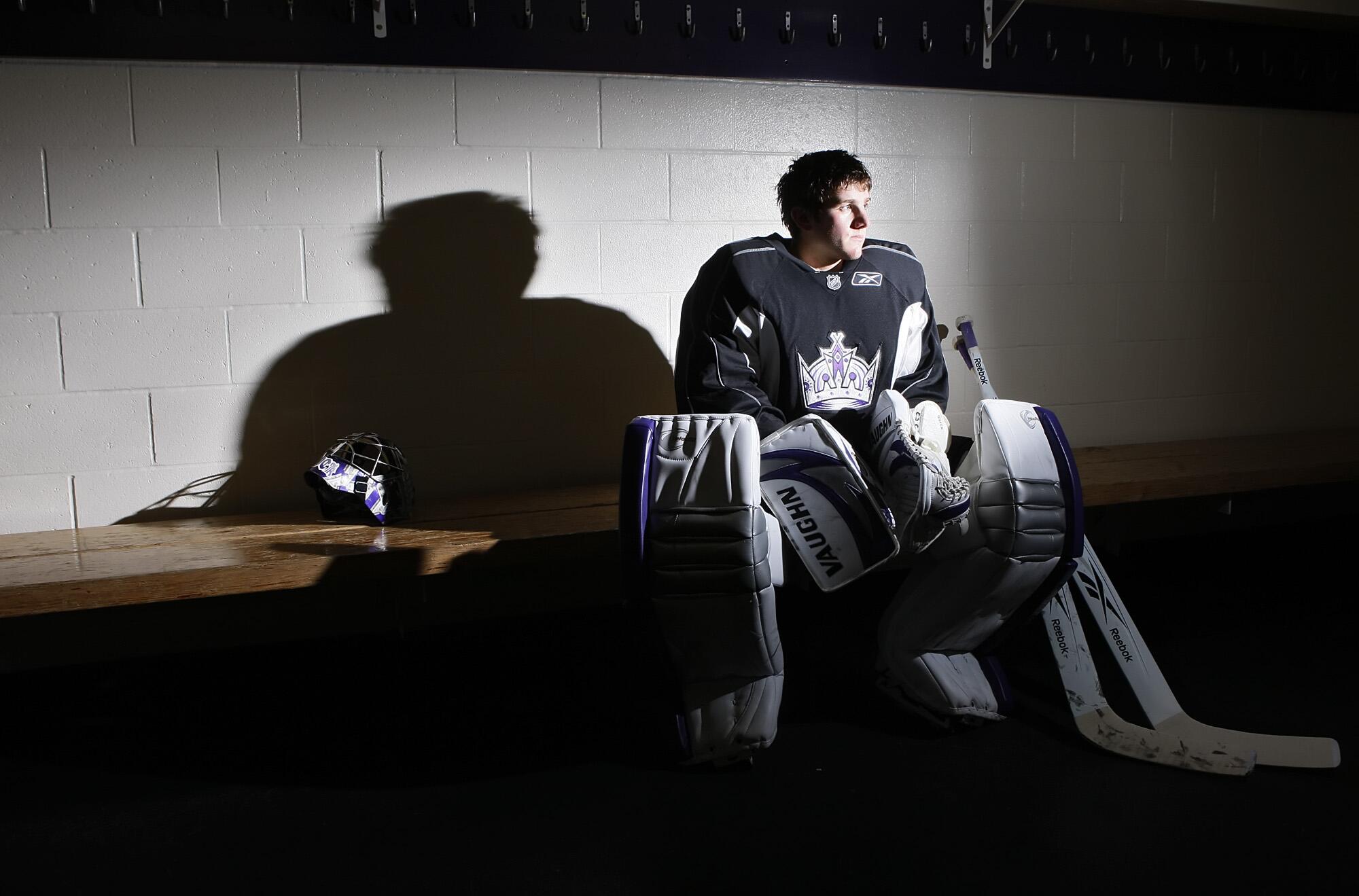
It’s sad he didn’t get to leave the Kings on his own terms, but life doesn’t always offer feel-good endings. Salary cap restraints prevented them from keeping him around purely out of sentiment, and he probably wouldn’t have wanted that. Blake had a responsibility to create the best roster now and for future seasons. Quick’s declining performance meant he could no longer be part of that, no matter how deeply he was loved by teammates and fans.
Remember Quick as he was in his prime: a great teammate, superb pressure performer, and the Jonathan who brought the Cup to Los Angeles twice more than most fans dared to dream was possible.
More to Read
Go beyond the scoreboard
Get the latest on L.A.'s teams in the daily Sports Report newsletter.
You may occasionally receive promotional content from the Los Angeles Times.


